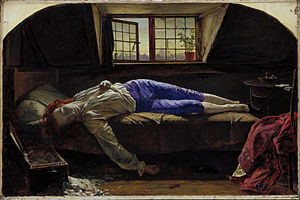Analysis of Apostate Will
Thomas Chatterton 1752 (Bristol) – 1770 (Holborn)
In days of old, when Wesley's power
Gathered new strength by every hour;
Apostate Will, just sunk in trade,
Resolved his bargain should be made;
Then strait to Wesley he repairs,
And puts on grave and solemn airs;
Then thus the pious man addressed.
Good sir, I think your doctrine best;
Your servant will a Wesley be,
Therefore the principles teach me.
The preacher then instructions gave.
How he in this world should behave;
He hears, assents, and gives a nod,
Says every word's the word of God,
Then lifting his dissembling eyes,
How blessed is the sect! he cries;
Nor Bingham, Young, nor Stillingfleet,
Shall make me from this sect retreat.
He then his circumstances declared,
How hardly with him matters fared,
Begg'd him next morning for to make
A small collection for his sake.
The preacher said, Do not repine,
The whole collection shall be thine.
With looks demure and cringing bows,
About his business strait he goes.
His outward acts were grave and prim,
The methodist appear'd in him.
But, be his outward what it will,
His heart was an apostate's still.
He'd oft profess an hallow'd flame,
And every where preach'd Wesley's name;
He was a preacher, and what not,
As long as money could be got;
He'd oft profess, with holy fire.
The labourer's worthy of his hire.
It happen'd once upon a time,
When all his works were in their prime,
A noble place appear'd in view;
Then ______ to the methodists, adieu.
A methodist no more he'll be,
The protestants serve best for he.
Then to the curate strait he ran,
And thus address'd the rev'rend man:
I was a methodist, tis true;
With penitence I turn to you.
O that it were your bounteous will
That I the vacant place might fill!
With justice I'd myself acquit,
Do every thing that's right and fit.
The curate straitway gave consent--
To take the place he quickly went.
Accordingly he took the place,
And keeps it with dissembled grace.
| Scheme | AABBCCDDEEFFGGHHBIJJKKLLMNOOPPQQRRAASSTTEELLTTPPUUVVWW |
|---|---|
| Poetic Form | |
| Metre | 01111110 1011110010 01011101 01110111 11110101 01110101 11010101 11111101 11010101 1010011 01010101 11011101 1110101 110010111 11010101 1110111 110111 11111101 11110001 11011101 11110111 01010111 0101111 01010111 11010101 01110111 11010101 01000101 11110111 111111 11011101 01001111 11010011 11110111 110111010 01101110 11010101 11110011 01010101 1110101 01001111 01001111 11010111 0101011 11010011 111111 1110111 11010111 1101101 110011101 0101101 11011101 01001101 011111 |
| Closest metre | Iambic tetrameter |
| Characters | 1,895 |
| Words | 337 |
| Sentences | 20 |
| Stanzas | 1 |
| Stanza Lengths | 54 |
| Lines Amount | 54 |
| Letters per line (avg) | 27 |
| Words per line (avg) | 6 |
| Letters per stanza (avg) | 1,468 |
| Words per stanza (avg) | 336 |
Font size:
Submitted on May 13, 2011
Modified on March 05, 2023
- 1:46 min read
- 59 Views
Citation
Use the citation below to add this poem analysis to your bibliography:
Style:MLAChicagoAPA
"Apostate Will" Poetry.com. STANDS4 LLC, 2024. Web. 1 May 2024. <https://www.poetry.com/poem-analysis/36203/apostate-will>.


Discuss this Thomas Chatterton poem analysis with the community:
Report Comment
We're doing our best to make sure our content is useful, accurate and safe.
If by any chance you spot an inappropriate comment while navigating through our website please use this form to let us know, and we'll take care of it shortly.
Attachment
You need to be logged in to favorite.
Log In